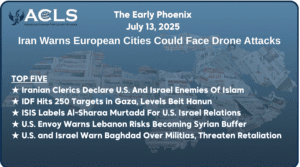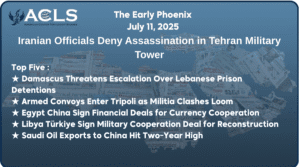The Region: A Middle East Newsletter
THE REGION is a weekly news digest summarizing significant Middle East developments that will be of interest to the English-speaking audience. The news items in THE REGION are curated by ACLS experts and drawn from a wide range of English, Arabic, and other regional language sources. Subscribe to this weekly newsletter and daily intercepts here.
Our top story: Saudi Arabia and the United States Confer on Imminent Plans by the Iranian Regime to Attack Targets in Saudi Arabia and Iraqi Kurdistan.
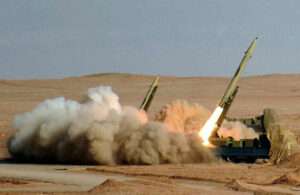
U.S. forces, Saudi Arabia, and several neighboring countries raised their military alert levels on November 1 after Saudi intelligence shared information with U.S. officials indicating that the Iranian regime had imminent plants to attack targets in Saudi Arabia and Erbil, the capital of Iraqi Kurdistan. Saudi officials told their U.S. counterparts that the Iranian regime intended the attacks to distract attention from the ongoing protest movement inside Iran, which has become the most serious internal challenge to Tehran’s authority since 1979.
The emergence of a serious Iranian regime threat to the security of Saudi Arabia and Iraqi Kurdistan may be forcing Washington to reconsider its recent hostile tone toward Riyadh. The Iranian threat was revealed just two days after U.S. officials briefed the media that the Biden administration was studying ways in which to “punish Saudi Arabia” for the recent OPEC decision to reduce oil production. It is also likely that Tehran has calculated that the U.S. administration’s new hostility to Riyadh offers the IRGC a window of opportunity to strike Saudi Arabia at a time when the United States is not committed to coming to the Kingdom’s defense.
IRAN
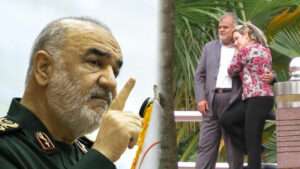
Facing Existential Challenge at Home, the Iranian Regime Lashes Out in the Middle East and Beyond
The sixth week of the popular uprising against the Iranian regime of Ali Khamenei began with an alleged ISIS suicide attack on October 26 at a shrine in Shiraz that left at least 15 dead and culminated with a threat from the Iranian judiciary on November 1 to hold thousands of trials for those charged with inciting protests. The judiciary’s announcement raised concerns that Khamenei and his regime are planning to escalate their crackdown and set the stage for mass executions of protesters.
The alleged ISIS attack in Shiraz was the first such attack inside Iran since 2018. The commander of the IRGC used the aftermath of the attack as an opportunity to issue a stern public warning to protestors that “Today is the last day of riots.” The IRGC commander also accused the United States, the Israeli “Zionist regime,” and Saudi Arabia of plotting the “riots” in Iran after “suffering failures in Yemen, Iraq, Lebanon, and Syria” at the hands of the Iranian regime.
The IRGC warning had little effect on protestors, who continued to stage mass demonstrations across the country. Video of university students holding hands, dancing, and chanting “Death to the Dictator” in demonstrations throughout the country went viral on social media platforms less than twelve hours after the IRGC commander’s warning.
The protest story was joined during the week by a second story that went viral among Iranians: leaked photos of Iran’s hardliner Interior Minister Rostam Ghasemi on a recent holiday in Malaysia, embracing his unmarried girlfriend, who was not wearing a headscarf. The scandal outraged the Iranian public on two counts. First, Ghasemi, who publicly adopts a pious image and is one of the most prominent enforcers of the regime’s hyper-puritanical laws, displayed a shocking hypocrisy by cavorting with an unmarried woman, something his own ministry might arrest everyday Iranians for doing. Second, the fact that Ghasemi’s girlfriend’s hair was uncovered was shocking at a time when Ghasemi and the entirety of the Khamenei regime have beaten Iranian women like Mahsa Amini to death for doing the same. The scandal illustrates how the regime’s hypocritical, Taliban-style policies have alienated Iranians wholesale.
In response to the regime’s crackdowns, young activists have adopted a new tactic: filming themselves running up to unsuspecting clerics and knocking their turbans off their heads. Videos showing young Iranians carrying out this act of defiance are going viral among Iranians, amplified by such media and social media figures as Masih Alinejad.
Regionally, the Iranian regime announced its satisfaction with the Iraqi Iraqi government formation process that saw the Tehran-aligned Coordination Framework place its candidate, Muhammad Shia al-Sudani, into the Prime Minister’s office. Iran’s Foreign Minister Amir Abdollahian was one of the first to congratulate his Iraqi counterpart, Fuad Hussein, and express “hope for a further growth in cooperations between the two countries in all fields in this new stage.” During the week, Abdollahian also called his Azerbaijani counterpart to express Tehran’s “vehement” opposition to any foreign presence in the South Caucasus region. During the call, Abdollahian stressed that Tehran will only maintain the “regional mechanisms” that include the three South Caucasian countries of Armenia, Georgia, and Azerbaijan in addition to Russia, Turkey and Iran.
Internationally, after Ukraine last week revealed evidence that the Iranian regime is participating directly in the Ukraine war on Russia’s side, the European countries and the United States began to harden their attitude toward Tehran. Germany’s Foreign Minister announced at the beginning of the week that Berlin is considering placing new sanctions on Iranian officials. The German announcement came soon after more than 80,000 protesters gathered in Berlin to demand a tougher German stance against the Iranian regime and in support of the Iranian protest movement. The Iranian regime’s response came via Iranian media outlets closely associated with Supreme Leader Khamenei, several of whom warned that Germany is playing with fire by contemplating sanctions against the IRGC. The regime’s media outlets also asserted that such sanctions would be “illegal” because the IRGC is an official military organization of Iran.
Iranian regime representatives employed the same “illegality” argument in trying to fend off diplomatic action against them in the UN Security Council in New York. Addressing the growing allegations by countries such as the UK and France that Iran’s transfer of drones to Russia is a violation of UN Security Council Resolution 2231, Iran’s UN ambassador asserted that UNSCR 2231 does not apply to the sale of drones–a claim that would be surprising to the Obama administration and other UNSC members who drafted the resolution in 2015. Separately, Tehran Times reported that Iranian Foreign Minister Abdollahian phoned his Ukrainian counterpart to deny western claims that Tehran has provided Russia with drones for use in the Ukraine conflict. Perhaps in response to Abdollahian’s straight-faced denial, Ukraine President Zelensky released a video of himself standing next to a downed Iranian drone in Kyiv.
As for the United States, on November 1, the Iranian regime announced that it has sanctioned ten American individuals and four American entities after Iran’s intelligence ministry claimed that the United States and UK are “directly involved” in organizing the Iranian protests. The ministry also claimed to have apprehended hundreds of “terrorists” linked to the “Zionist regime” [aka Israel].
The Iranian regime’s “sanctions” fell on such U.S. individuals as CENTCOM commander Erik Kurilla, Deputy Treasury Secretary Wally Adeyemo, and former Treasury Department official Juan Zarate, though it was not immediately clear why Tehran would sanction American officials who have no financial interest in Iran and certainly no intention to try to visit Iran anytime soon. The Iranian regime also “sanctioned” the CIA, the 9th U.S. Air Force, the U.S. Army National Guard, and the private U.S. activist organization called United Against a Nuclear Iran–none of whom, as far as ACLS knows, have any financial exposure in Iran or members who would be seeking a visa to travel to Iran.
ARAB LEAGUE
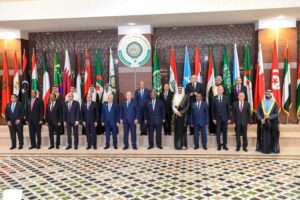
Tension at Arab Summit Over Yemen and Over Iranian and Algerian Supply of Drones to Western Sahara Separatists
The Arab League Summit held in Algeria last week was attended by 15 Arab leaders, led by Egypt, Tunisia, and Qatar, along with guests such as UN Secretary General Guterres, the president of Somalia, and the president of Azerbaijan. The heads of states of Saudi Arabia, Kuwait, and the UAE chose not to attend, sending their foreign minister, crown prince, and vice president, respectively. King Abdallah of Jordan was present, but assigned his son Crown Prince Hussein bin Abdullah as head of the Jordanian delegation.
This summit, the first in three years due to COVID-19 pandemic, convened in Algiers under the title “Unity,” but that concept was undermined when the King of Morocco made a late decision not to attend after reports emerged that Algeria had coordinated with the Iranian regime to supply Iranian military drones to the Polisario Front, the Western Sahara separatist movement engaged in a decades-long conflict with Morocco.
Despite the tensions among some Arab states, the summit concluded with calls for more effective mechanisms for Arab cooperation and a consensus to condemn external interference in the internal affairs of Arab nations. The delegates also pledged to reaffirm the “centrality” of the Palestinian issue and its peaceful solution in regional affairs. Concerning the Yemen conflict, the summit emphasized support of “the legitimate Yemeni government” and called for a renewed truce and political solution to the conflict. Though the delegates’ language was indirect concerning Yemen, their implication was that the Houthis are obstructing a resolution to the conflict, and that the Yemeni government that opposes the Houthis should receive international support.
The Kingdom of Saudi Arabia will be the host of the next summit, although Saudi Crown Prince Muhammad bin Salman made a late-breaking decision not to attend the Algiers gathering after the King of Morocco declined to attend presumably because of Algeria’s actions in the Western Sahara.
GULF REGION

Germany Reverses Harsh Comments About Qatar and the World Cup
The FIFA World Cup 2022 to be held in Qatar faced some political turbulence in recent days. In public remarks on October 27, Germany’s Interior and Sport Minister Nancy Faeser said that Qatar should not have been awarded the hosting of the World Cup because of Doha’s human rights record. “There are criteria that must be adhered to and it would be better that tournaments are not awarded to such states,” Faesar said. Faesar’s remarks prompted immediate unified condemnation from the Gulf states and resulted in Qatar’s Foreign Ministry summoning the German Ambassador for the first time in years. Faced with the Gulf countries’ outrage, the German government walked back Faeser’s remarks, and on November 2, Germany announced Faeser herself will lead Germany’s delegation to Doha to attend the German team’s first match. A contrite Faeser made a quick visit to Doha and went so far as to praise Qatar’s preparations for the World Cup, apparently fully reversing herself.
Presenting the “Desert Rose” symphony for the opening of the World Cup in Qatar will be Syrian American composer Malek Jandali, to be a message of peace to the world.
IRAQ
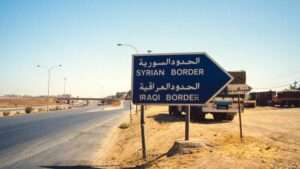
Iraqi Narco Trafficking on the Rise
One worsening issue that will confront the new government is the increasing wave of Iranian narcotrafficking in Iraq–especially crystal meth, a menace that has brought social catastrophies such as abductions and rape of children. An Iraqi secret agent in Basra told the Washington Post on October 12 that the smuggling of drugs began after opening the borders with Iran in 2003 but it wasn’t until 2017 that crystal meth began to appear. Iraq since then has been the port of entry of this drug coming from Iran to Turkey, Jordan, and Syria. Last year, Turkish authorities confiscated 5.5 tons of Methamphetamine. Despite Turkish counter-drug raids on the Iranian-Turkish borders, authorities say the amount of drugs confiscated continues to grow, reaching 8.6 tons in the first seven months of 2022. The Turkish authorities confirmed that the smuggling network includes Iranian citizens connected to regional organized crime cartels and part of these cartels objectives is to ensure the delivery of the drugs to countries in the EU, southeast Asia, and Austrlia.
Jordanian authorities also announced the confiscation of 45 tons of the material coming from Iraq in the first nine months of 2022, 20 tons more than seized in all of 2021. Syria, since 2011, has been a centralized narcotics manufacturing and exporting hub to Europe, North Africa, and the Gulf with more than 14 Captagon, 12 Crystal Meth, and 23 Marjuana manufacturing entities all under the control of Iranian-backed militias, the Assad regime, and their allies.
Poverty Spiking Among Iraqis, Despite Enormous Government Budget
Meanwhile, a recent study published on October 31 revealed the startling statistics that 25% of Iraqis, or nine million of Iraq’s population of 40 million, are now below the poverty line. In addition, 14% of Iraqis, or about four million people, are unemployed. These worsening poverty figures come during a year when the Iraqi government has generated massive revenues of $11 billion per month from oil sales alone.
New Government, or New Inheritance Distribution List?
Iraqi analysts forewarn of serious challenges that will face the new Iraqi government and see little prospect for near-term solutions to Iraq’s internal or foreign crises. Ihsan al-Shammari, a professor of Political Science at Baghdad University, said Iraq’s problems are not the result of the turbulent turnover of Iraqi governments, but rather “a defect in the structure of the system and how the political class chooses to deal with social democratic changes.”
Political analyst Ali Al-Baydar, meanwhile, judged that “the problem lies in the fact that this government comes with the same political bloc ideology that has [prevailed] since the overthrow of Saddam’s regime in 2003” and that the political blocs consider the state’s wealth and resources “part of their inheritance that is supposed to be distributed among them.”
As for Moqtada al-Sadr’s demand for new parliamentary elections within a year, Al-Shammari explained that the new government intends to fend off Sadr’s demand and implement a “containment strategy” against Sadr and his movement. Laheeb Hegal of the International Crisis Group agreed, noting that “the parties supporting the current government are not interested in holding early elections,” and believe that “a year deadline for holding them is not realistic.” Hegal also pointed out that the new prime minister is seeking to achieve a balance between the West and Iran.
Iraqi analysts also judged that the new governing coalition made a mistake in forming the new council of ministers based on quotas for positions. Ministerial positions were assigned based on religious sectarianism and ethnicity, with 12 cabinet posts going to Shi’ites, six to Sunnis, two to Kurds, and one woman representing Iraq’s minorities. The only real change in this cabinet’s distribution is that all twelve Shi’ite ministers are from the Coordination Framework blocs, representing the Shiite factions most closely aligned with Iran.
YEMEN

Houthis Continue Warfare
According to official reports by the Yemeni government in Aden, about 130 civilians were killed or wounded by fire and landmines of the Iranian-backed Houthi militia in Taiz since the end of the truce in Yemen in early October. The United Nations Security Council condemned the October 21 Houthi attack on the Yemeni oil port of Al-Daba using drones. Four days later, Yemeni security authorities closed the port of Mukalla after monitoring drones believed to be affiliated with the Houthi militia. And in the closing remarks of the Arab League Summit in Algiers, the President of the Arab League explained that recent developments in Yemen are clear examples of “negative and detrimental regional interferences in Arab affairs”–an indirect way of condemning the Iranian regime for its military intervention via the Houthis.
NORTH AFRICA

Massive Protests Against Army-Brokered Deal in Sudan
“Thousands took to the streets of Sudan’s capital, Khartoum, Wad Madani, El Obeid south of the capital, Gedaref and Port Sudan in the east, Atbara in the north and Nyala in the southwestern Darfur region, this week, to mark the first anniversary of a military coup that upended the nation’s short lived-transition to democracy,” Le Monde reported on October 25. Sudanese Army Chief General Abdel Fattah al-Burhan declared that the army would distance itself from the political battleground in the country, but he then claimed that Islamist political forces are blocking the process of an agreement. Sudan Tribune, a government-led media outlet, reported on November 1 that “a group of lawyers loyal to the dissolved National Congress Party (NCP) on Tuesday launched an attack with sticks and tear gas on the Sudanese Bar Association headquarters, in an attempt to seize it.”
On October 29, thousands more demonstrators gathered in front of the headquarters of the UN mission in Khartoum to protest against the expected political settlement between the military and civilians, and against foreign interference in the country’s internal affairs. The United Nations delegation’s spokesperson, Florence Marshal, stressed that UNITAMS, the African Union and IGAD are working with the Sudanese parties to reach a broad understanding that leads to a solution, but signaled that these talks were unlikely to be concluded soon.
Putin’s Mercenaries Deepening Their Involvement in Sudan
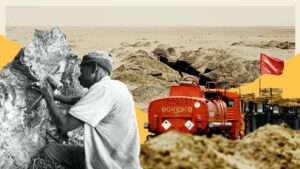
On November 2, the European think tank OCCRP reported that Russian mercenaries are playing a significant role in Sudan’s conflict. “Wagner, the Russian mercenary company owned by the infamous businessman Yefgeny Prigozhin, secured and maintained its position in Sudan’s gold sector while working closely with companies affiliated with Sudan’s brutal military,” the OCCRP report stated. The investigative report also explained that the Sudanese military companies are purchasing arms with gold. Richard Messick, an anticorruption expert, said Wagner and the Sudanese military were “two of the blackest of the black figures in the world economy.” The OCCRP report illustrates that the Russian role in the Sudanese conflict receives too little notice in Washington.
Turkey and Libya’s Tripoli-based Government Sign Military and Economic Deals
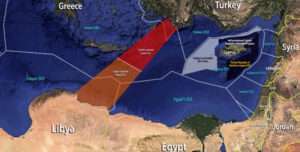
Eleven years after the UN-assisted overthrow of Ghadafi in 2011, Libya is still struggling to reach an agreement between its rival administrations to hold national elections. Currently, there are two governments in Libya, the UN-supported government in Tripoli, also supported by Turkey; and the rival government in Benghazi supported by Russia, the UAE, and Egypt. As one analyst noted, “While all parties involved agree on the importance of restoring and maintaining stability in Libya, they disagree on how this goal can be achieved.”
Turkey supports Abdul-Hamid Dbeibah’s government in Tripoli while Egypt remains a key ally of Khalifa Haftar, the former head of the Libyan Army during Ghadafi’s rule who still controls most of the eastern parts of Libya. The Egypt-Turkey dispute over Libya deteriorated further earlier this month when the Dbeibeh government signed a memorandum of understanding with Turkey on the exploitation of Libyan hydrocarbons. On October 25, Dbeibah’s government also signed two new military cooperation agreements with Turkey based on a 2019 agreement between Ankara and the government of Fayez al-Sarraj–a deal that gives Turkey claim to large and potentially gas-rich areas of the eastern Mediterranean, angering Egypt, Greece, France and the European Union, reported The Defense Post.
Libya-Turkey Deals Anger Egypt, Lead to Halt in Cairo-Ankara Dialogue
In response to the new Libya-Turkey economic and military agreements, Egypt on October 29 halted its Libya-focused dialogue with Turkey, with Egyptian Foreign Minister Sameh Shoukry explaining that Egypt took the step “because there was no change in Turkey’s practices in Libya.” According to Shoukry, the Libya-Turkey agreements further complicate the situation in Libya and makes it more difficult to reach a common agreement between Libyan parties in order to hold long-awaited national elections.
Algeria Explains Muhammad bin Salman’s Absence from the Arab Summit
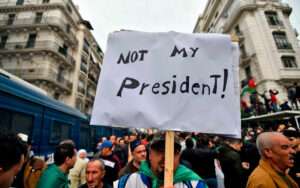
The Algerian presidency released a statement before the beginning of the Arab League Summit that Saudi Arabia crown prince Mohmad Bin Salman had to withdraw from attending the Arab League Summit on advice from his doctors not to travel. The Saudi royal court confirmed that doctors have advised the crown prince to “avoid long-haul flights that might affect his middle ear.”
The statement released on the Algerian Press Service said that MBS called President Abdelmadjid Tebboune to apologize for for not being able to participate in the summit on November 1, in accordance with the recommendations of doctors who advised him not to travel.
Algeria, since the removal of President Bouteflika in 2011, is still being led by the former president’s housing minister, Mr. Abdelmadjid Tebboune, now 74.
TURKEY
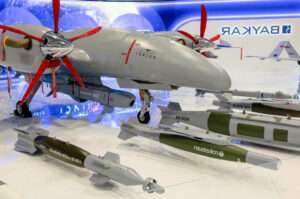
Turkish Drones May Soon Shoot Down Iranian Drones in Ukraine
Meanwhile, the Turkish military drone manufacturer Bayraktar announced on October 30 that an impending integration of air defense missiles to the Bayraktar TB2 drone will create a low-cost air patrol capability to shoot down kamikaze drones and attack helicopters without having to rely on high-cost air-to-air missiles.
Turkey Calls Putin’s Bluff in the Black Sea
This week Turkey led an international effort to force Russia to allow UN-brokered grain shipments to continue from Ukraine’s Black Sea ports. After Moscow rescinded its participation in the UN grain export deal and threatened to stop any shipments by force, Turkey called Moscone’s bluff by sending naval vessels to escort the grain shipments anyway. Turkey’s move forced Russia to return to the grain shipment agreement, “ending four days of non-cooperation that still saw exports continue from Ukrainian ports.”
LEBANON
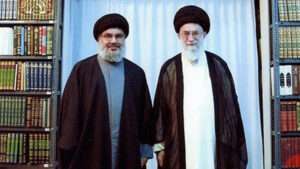
Nasrallah Claims Israel Still Occupies 2.5 sq km of Lebanese Waters, Which Lebanon Must “Liberate”
After the final signature of the Lebanese-Israeli maritime demarcation agreement, Hassan Nasrallah said on October 31 that no security guarantees were given to Israel and that there is a disputed area of “2.5 square kilometers” still not resolved. Nasrallah claimed that because of the Russian-Ukrainian war, the West’s need for oil and gas, and, most importantly, “the lack of readiness of the enemy (Israel) to enter into a war,” the United States was compelled to avoid any new wars in the region. In his televised appearance, Nasrallah also claimed that the power of Hezbollah’s deterrence had forced the Israeli “enemy” to avoid war, and asserted that negotiations had almost failed and the situation was headed toward war before the “enemy” retreated. As for the remaining disputed 2.5 square kilometers (out of the 860 square kilometers covered by the maritime agreement), Nasrallah said that area is still occupied by the “enemy,” and “Lebanon must work to liberate it.”
Activists Mock End of Aoun’s Presidency While Parliament Rejects Aoun’s Eleventh-Hour Attempt to Dissolve the Mikati Government
Meanwhile, in the Lebanese political sphere, President Michel Aoun’s term ended on October 31 with no successor in place. Lebanese activists greeted the end of his term by making the viral hashtag “History will curse you” and numerous pictures and phrases mocking the unpopular Aoun’s departure.
On his last day in office, Aoun signed a decree declaring the government of Prime Minister Najib Mikati to be dissolved, but Mikati rejected the decree and claimed that Aoun no longer had the legal authority to issue it. The Lebanese Parliament quickly sided with Mikati, voting to reverse Aoun’s decision and declaring the outgoing president’s decree unconstitutional. The next day, Gibran Bassil, Aoun’s son-in-law and head of Aoun’s Free National Party, claimed that Hizballah, Parliament Speaker Nabih Berri, and Mikati had made an agreement that the government would hold no cabinet sessions as long as the presidency was vacant. Bassil also announced that he would be visiting Bashar al Assad to discuss the details of an agreement Bassil had reached with Hassan Nasrallah, by which Bassil and his rival Samir Geagea supposedly would agree on a third candidate to assume the presidency.
SYRIA

Russians and Assad Step Up Bombardment of Displacement Camps, Making Camp Conditions Unliveable
The Russian military has stepped up its bombardment of displaced persons camps in northwest Syria in recent weeks, launching cluster munitions and ballistic missiles to cause mass casualties. Russian airstrikes, combined with the Assad regime’s artillery attacks, leave civilians dead or wounded on daily basis. The attacks have exacerbated what was already a humanitarian catastrophe in the camps. According to humanitarian NGO monitors, 148 camps in northwest Syria have been burned since the beginning of 2022. In those camps, which house hundreds of thousands of Syrians displaced by war from their homes elsewhere in the country, open sewage has increased the level of disease by 37%. In addition, 81% of the camps face a food security crisis, with 93% lacking enough bread for daily requirements. The camps’ infrastructure is shockingly insufficient for their population: 77% of the camps’ roads are unpaved, 47% percent of the camps lack clean and potable water, 84% lack medical clinics, and 67% lack access to schools.
World Health Organization Investigates its Own Damascus Branch for Massive Pro-Assad Corruption
The World Health Organization is investigating shocking allegations that its office in Syria colluded with Assad regime officials, paid bribes, misappropriated funds, and violated WHO COVID-19 guidelines during the pandemic. The investigation was prompted by WHO staff whistleblowers who made charges particularly against the WHO’s representative in Damascus, Dr. Akjamal Makhtumova, who staffers claimed pressured them to sign contracts with Syrian regime politicians. The allegations of corruption were a stunning indictment of the UN health agency’s Damascus operation, which enjoys a budget of more than $115 million.
Assad’s Captagon Revenues Expand by Billions, While Jordanian Businessmen Seek More Trade with Assad
Syria TV reported on findings first published by the AFP that Syria’s Captagon trade produces more than $10 billion in annual profits. Though regional countries reportedly confiscated more than 400 million Captagon pills in 2022, shipments are expected to increase in future years. Jordan is one neighboring country where government officials announce daily confiscations of Captagon shipments sent to Jordan across borders controlled by the Assad regime. But at the same time that the Jordanian military and law enforcement are engaged in intense clashes to try to stop Syrian-regime-affiliated Captagon traffickers on the frontier, Jordanian businessmen visited Damascus to discuss ways to boost trade with the Assad regime.
Lebanese Government Pushes Syrian Refugees to Return into Threatening Conditions in Syria
Lebanese authorities continue to return Syrian refugees to Syria, despite UN declarations that Syria remains too unsafe for refugees to return. Syria TV reported that some of the refugees pressured to leave Lebanon were detained just days after they returned to Syria. The Syrian Network for Human Rights documented 208 cases of arbitrary arrest, including seven children and five women, in October 2022, and Syrian opposition media outlets reported that Assad regime intelligence branches are still arresting Syrians for comments on Facebook. A Palestinian NGO raised concerns about the Lebanese government forcing Palestinian refugees who had fled from Syria to return to that country. The Working Group for Palestinians of Syria detailed the conditions that make Syria too unsafe for Palestinian refugees to return there, in light of the Lebanese government’s announced intention to return 15,000 refugees to Syria each month.
Refugees Want Germany to Stop Assad from Collecting Extortionate Passport Fees; More Refugees Brave Dangerous Sea Crossing
In light of the Syrian government’s announcement that the fee for Syrians to obtain a passport would increase from $800 to $1000, Syrians in Germany launched a campaign asking the German government to stop requiring Syrian refugees to obtain official documents from the Syrian embassy in Berlin. Syrian activists noted that this arrangement amounted to the German government effectively funding the Assad regime.
Meanwhile, in an indication of the increasing number of Syrian refugees attempting the dangerous passage to Europe by sea, Greek port authorities announced on November 1 two rescue operations to find 60 people missing at sea 80 kilometers northwest of Athens. In the first eight months of 2022, the Greek Coast Guard reportedly rescued 1500 people, 600 more than were rescued in all of 2021. More than 30 people, including at least 13 children, have already been confirmed dead at sea since the beginning of October 2022.
The Guardian Uncovers–But Refuses to Publish–New Video of Tadamoun Massacre
After the gruesome video that emerged six months ago showing an Assad regime official massacring dozens of residents of the Tadamoun neighborhood of Damascus, another video has emerged of the official, Amjad Youssef, committing murders onscreen in Tadamoun. However, The Guardian, having gained access to the video, the 2nd of 27 such videos showing the Tadamoun massacres, has declined to publish the footage. The Guardian reported that the video depicts horrific acts by the same squad including Youssef shooting six women, throwing them into a ditch, taking turns pouring gasoline over their bodies, and burning the bodies before a bulldozer covered the mass grave. A former colleague of Amjad Youssef revealed that Youssef routinely kidnapped women and that he had seen Youssef in one instance “taking [innocent] women from the bread queue,” after which “they were definitely raped or killed.” Despite earlier claims that Youssef had been arrested by the Assad regime, sources in Syria now report he is still actively working as an intelligence officer in Kafr Sousa despite having committed 12 other mass killings. The fact that Yousself has not been arrested or imprisoned indicates that the Syrian regime recognizes Youssef’s mass murder activities were not rogue actions, but rather were actions he was ordered to carry out by the regime chain of command itself.
Syrian-American Think Tank Exposes Assad Regime Cover-Up of Mass Murders in Deraa
In a similar case, the Washington-based Syrian-American think tank Syria Justice and Accountability published an investigative report entitled “Leave No Traces” detailing the methods the Assad regime used to cover up mass executions in Deraa in 2012. In a scene reminiscent of Youssef in Tadamoun, one video described in the report shows an Assad regime officer taking pictures of people’s faces and then pouring gasoline on their face and hands to obliterate the identity of those killed.
We welcome your feedback and ideas. If you have comments about “The Region” or want to recommend items to include in the newsletter, send your suggestions to [email protected].


